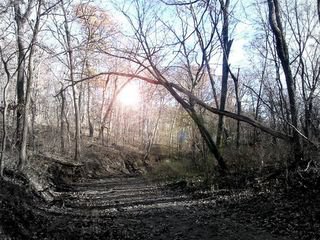“I would have despairedAt times, the realization creeps in, slightly haunting, but less so that I might expect: this is not the land of the living. This is a dying world. Vitality has yet to fully arrive here. We are still not really alive.
Unless I had believed
That I would see
The goodness of the Lord
In the land of the living.”
- Psalm 27:13
To admit, at least in the privacy of my own thoughts, that this world is peopled with corpses in various degrees of animation, should and does have considerable emotional impact. (“I see dead people…”) But the reaction is different than I would expect. I feel myself recoiling, as from something that you’re ‘not supposed to say,’ something unpleasantly ‘morbid,’ distastefully ghoulish—but not, in essence, untrue.
When I’m driven to the point of honesty, I find myself agreeing with king David’s assessment, even though I know it’s uncool. This world can be realistically pictured only through the lens of the next one. And in light of heaven, no one I see around me is really alive—let alone me. This world of the dying makes a kind of sense only when stacked next to the “land of the living.”
The present earth, “this dying life, or should I call it living death?” (Augustine), is a system whose inequities cannot be comprehended without additional conditions. But the ‘sanctifying’ provision does, in fact, exist. David calls it the land of the living. Add this reality to the world we see around us, and something altogether transforming emerges.
We live in a mysterious atmosphere where death, in the end, can be good, where people rise from funereal sleep and awake into unbearable glory. For some people, death will confer a deathless vitality. As George MacDonald puts it in his novel Lilith:
On some faces lingered the almost obliterated scars of strife, the marrings of hopeless loss, the fading shadows of sorrows that had seemed inconsolable: the aurora of the great morning had not yet quite melted them away; but those faces were few, and every one that bore such brand of pain seemed to plead, “Pardon me: I died only yesterday!” or, “Pardon me: I died but a century ago!”
Death will have its uses. Because the fact remains: this is a world where death may not be avoided, despite all efforts to the contrary. ("If your thoughts should turn to death, gotta stomp ‘em out like a cigarette;" Bright Eyes.)
This fact of death, supposedly the trump card of the anti-theist, is actually the ace up the sleeve of the Christian. This is where, metaphysically, we unabashedly cheat. Because death is not what it seems.
We don’t see the whole panorama yet. But the day will come when the temporal picture frame of this life will break up, disintegrate, as all makeshift things do—and then we will spill out into the untapped land of the living. This will be a kingdom without borders, where death has already served its turn.
In the land of the living, death will be denatured. In the land of the dying, death is essential—and not only in its physical form. As Augustine says paradoxically, “One who has not died and risen may live on but he lives evilly—and if evilly, not really living. Let him die, lest he die. How can he die lest he die? By undergoing conversion lest he undergo damnation.”
In a dying variety of world, you had better die. And you had better do it quickly (and often), before ‘death’ steals from you the chance. A death to self, and a yes to Christ, repeated throughout life, subdues the apparent morbidity of this world to a hidden reality.
And so we bend our lives to this death-shaped mold, and by doing so, we find that the mold has already been shattered. Broken by Christ. Why do we tolerate this deathly pattern at all? In the words of Paul, the brilliant theologian and martyr:
“…that I may know him and the power of his resurrection, and may share his sufferings, becoming like him in his death, that by any means possible I may attain to the resurrection from the dead” (Philippians 3:10-11).
We die in order to defeat death entirely, and live with Christ. Therefore, appraising this dying world honestly leads not to despair, but to the vision that sees beyond. In this land, we die. In the living world, we will have a new preoccupation.
In the meantime, remembering the address of our current residence can make all the difference.











2 comments:
>>In a dying variety of world, you had better die.<<
You frame this in a provocative paradox. Thanks for the fresh insight.
>>And so we bend our lives to this death-shaped mold, and by doing so, we find that the mold has already been shattered.<<
I kinda got lost here. That being the case, Paul's words put be back on the path.
Thanks for the comment, Oneway. One thing I appreciate about your takes is that they often give me some insight into how to write more ludidly. I hate it when 'eloquence' (or the attempt) confuses clear meaning. Much appreciated.
The apostle Paul's writing is very instructional on this point, as the epistles combine heady theology with gripping metaphor, and nothing gets lost in the process.
Post a Comment